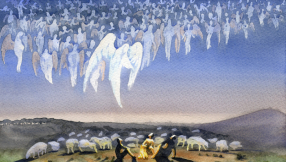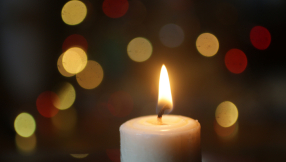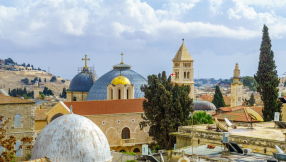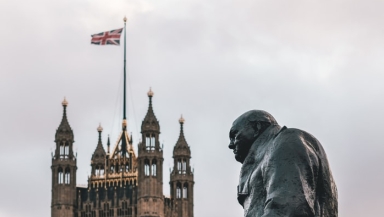
Christian Concern's publishing arm, Wilberforce Publications, is due to launch its latest book, Beyond the Odds – Providence in Britain's Wars of the 20<sup>th Century, next month in time for Remembrance Day.
Beyond the Odds explores turning points in the two World Wars, with in-depth accounts of diplomacy and wartime operations, the beliefs of commanders and National Days of Prayer.
John Scriven, co-founder of Wilberforce Publications, is the main author. A former chairman of The Lawyers' Christian Fellowship, he served as a captain in the Queen's Regiment of the Territorial Army.
Tim Dieppe, Christian Concern's Head of Public Policy, contributed two chapters to the book, including one on the Christian worldview of Britain's World War II Prime Minister, Winston Churchill.
Christian Today spoke to them about their new book and the vital spiritual and moral issues it raises about our nation.
CT: In Beyond the Odds you list the National Days of Prayer in Britain from 1900 to 1950, including nine during World War II, which were called by the King in consultation with the Archbishop of Canterbury. How did the public respond to these and how widespread was Christian belief during those times?
JS: Historian Arthur Bryant wrote in 1956 about the National Day of Prayer on 26 May 1940. This took place as the British army's Expeditionary Force in France (BEF) was encircled by the German army with seemingly no hope of escape. Bryant recorded: "The churches were packed with worshippers and a special Service of Intercession was held at Westminster Abbey."
There is an archive picture of a long snaking queue, about four abreast, waiting to enter Westminster Abbey for that service. Churchill wrote of it: "The English are loath to express their feelings, but in my stall in the choir I could feel the pent-up, passionate emotion, and also the fear of the congregation, not of death or wound or material loss, but of defeat and the final ruin of Britain."
Local newspapers from the time report crowded services with often the largest congregations ever seen for National Days of Prayer. Sporting events were cancelled as the people turned in humble sincerity to appeal to God on behalf of the nation.
We can easily forget the widespread influence of the Christian worldview among the wartime generations, and the perspective of faith is rarely mentioned by historians.
In the first half of the twentieth century, around 40 per cent of five- to 15-year-olds attended Sunday School, 70 per cent claimed to attend church at least occasionally, about a quarter read the Bible regularly and half prayed regularly.
In his broadcast on D-Day in 1944, King George VI was able to say: "At this historic moment surely not one of us is too busy, too young or too old to play a part in a nation-wide, a world-wide vigil of prayer as the great crusade sets forth."
CT: In his foreword to your book, retired Major General Tim Cross writes: "As well as describing events in compelling narrative, this book, uniquely in my experience, unashamedly focusses in on the Christian faith of many of the key players in these campaigns." Can you think of a turning point in Britain's wars that seems to have been a direct answer to the prayers of committed Christian commanders in the country's armed forces, supported by the National Days of Prayer?
JS: Before the National Day of Prayer on 26 May 1940, British General, Alan Brooke, wrote in his diary on the evening of 23 May: "Nothing but a miracle can save the BEF now and the end cannot be far off."
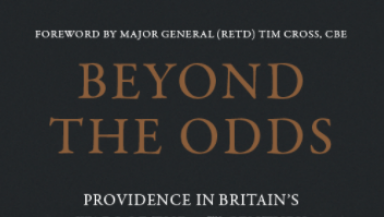
After the National Day of Prayer, a number of extraordinary events enabled 338,000 British and French troops to be evacuated by naval and civilian craft at Dunkirk.
Crucial decisions were taken by commanders. The BEF Commander-in-Chief, Lord Gort, refused to agree to the War Cabinet plan to break out to the south and unilaterally decided to evacuate. Generals Brooke and Montgomery stopped the BEF from being cut off from the coast in the north-east. The French held out at Lille and the British and French defended Calais, possibly gaining four extra days for the evacuation.
Every Royal Air Force Hurricane and Spitfire squadron except three was in the air during the evacuation, shooting down 176 aircraft for the loss of 106. And, during the retreat and on the Dunkirk perimeter, British and French troops fought on in hopeless positions long enough to delay the enemy, though they knew there was little chance of survival.
But there were also circumstances beyond the range of the Allies' control, without which the evacuation would not have succeeded. At the time, these were particularly acknowledged to be an answer to prayer.
There was the grounding of the German air force, the Luftwaffe, by bad weather as the troops headed for Dunkirk. There was the 'halt order' given to the German Army's Panzer tanks at a crucial moment, which was inexplicable to their commanders on the front line. And, critically, there was the calm sea in the English Channel, which enabled the 'small boats' to rescue British troops from the shore.
In a speech in the House of Commons, Churchill described Dunkirk as "a miracle of deliverance". The Daily Telegraph reported: "Officers of the highest rank do not hesitate to put down the deliverance of the BEF to the fact of the nation being at prayer on Sunday."
CT: Three chapters in the book consider the First World War. Do you think that Britain was right to enter that war?
JS: Until the beginning of August 1914 - Britain declared war on the 4<sup>th - it was not certain that Britain would join. As late as Sunday 2nd August, before the German invasion of Belgium, Liberal Prime Minister Asquith could write that "a good three-fourths of our party are for non-interference at any price" and Lord Beaverbrook, an MP in 1914, writing in 1928, thought that: "Even inside the Cabinet itself a majority for non-intervention could certainly have been obtained if a strong man had stepped forward to lead the pacifists."
In the end, the principal question for Britain, which was decided in the House of Commons on 3 August 1914, was the one that had preoccupied British foreign policy for hundreds of years. Would Britain allow one nation – in the past the Spanish in the 16<sup>th century, Louis XIV in the 18<sup>th and Napoleon at the beginning of the 19<sup>th – to dominate Europe? By 1914 German policy was largely decided by the military and a German victory would reinforce this.
The historian Philip Jenkins takes the view that, if Germany had won the First World War, Hitler's later war aims would have already been achieved – Germany would have held total mastery of Europe with Lebensraum (living space) in the east, together with millions of serfs.
CT: What is your view of the Allied bombing of civilians in German cities in World War II?
JS: The bombing of civilian targets in Germany was a strategic and a moral failure. Alan Brooke, the Chief of the Imperial General Staff, opposed it, writing in 1942: "We are now reaping the full disadvantage of an all-out independent Air Policy directed at the bombing of Germany. As a result, we are short of all suitable types of aircraft for support of the other two services. It is an uphill battle to fight."
Though not a member of the War Cabinet, Sir Archibald Sinclair, the Secretary of State for Air, like Brooke a practising Christian, opposed the bombing of Dresden in 1945.
The bombing campaign did have some successes against industrial targets. These included the attack on the dams in the Ruhr in 1943 which reduced steel production by 200,000 tons, the attack on the jet-propelled rocket research station on the Baltic island of Peenmünde in August 1943, which set back the German programme for some months, and the attacks on the ball-bearing plants at Stuttgart in September 1943 and at Schweinfurt in October 1943.
But overall the bombing campaign absorbed British industrial production that could have been put to better use. Historian Norman Stone calculates that during the war some 2,800,000 tons of bombs were dropped, nearly half British, and that the bombing killed about 500,000 Germans with the loss of 160,000 Allied airmen in Europe.
CT: In his 2014 book on Winston Churchill, Boris Johnson neglected to mention the evangelical Christian faith of Churchill's nanny, Elizabeth Everest. What spiritual and moral influence did Mrs Everest have on Churchill?
TD: It was Mrs Everest who first introduced Christianity to Churchill. Mrs Everest was a devout Christian of evangelical persuasion. Churchill wrote that she was low-church and that this caused him to be partial to low-church principles as a school boy. He later described her has having a "simple faith".
I think it is beyond doubt that Mrs Everest read the Bible with Churchill and prayed with him and openly discussed her faith with him. It is also undoubtedly the case that Mrs Everest prayed for the young Winston.
Churchill later wrote that Mrs Everest "was my confidant" to whom he poured out all his troubles. Her lasting influence is shown by the fact that a photograph of Mrs Everest was kept hung in Churchill's room right up to the end of his life.
CT: In your epilogue, Mr Scriven, you mention sociologist Callum Brown identifying what he called "the death of Christian Britain" as beginning in the 1960s. How is the "death of Christian Britain" impacting our society now?
JS: The years since the Second World War have brought many changes in society, some beneficial, but the decline in Christian faith and what used to be a generally accepted Christian worldview has brought shifts in culture and laws that are dismantling the foundations of what many Christians believe to represent the God-given created order, which the wartime generations would have accepted as a given.
These relate to the beginning and end of life, the family and education, as well as other issues ranging from free speech to gambling.
At the beginning of life, the 'human right' to 'reproductive health' is said to include abortion. While this has been characterised as a 'public health good', many will mourn the death of over nine million unborn babies who have died by abortion in Britain since 1967, each one a unique and precious human life, full of potential.
'New truths' have challenged the traditional family structure which Christians may say has brought about societal stability and human flourishing for millennia across most cultures of the world.
For example, regardless of parenting ability, same-sex parenting permanently deprives a child of the love and care of either a mother or a father, together with the heritage of at least one of its biological parents. Some schools teach that gender, biological sex and sexual attraction are separate from each other, and that gender identity is a matter of choice.
Christians may be nervous about giving their views on certain issues, but nevertheless may feel that they have a duty to speak out for the common good.
There is a perception among many Christians that, if there is not a widespread change, the nation cannot expect God's protection, which it experienced in the Second World War, in the serious challenges that it is likely to face in the future. But that change may only be possible if there is a revival of the Christian faith, for which many Christians continue to pray.










